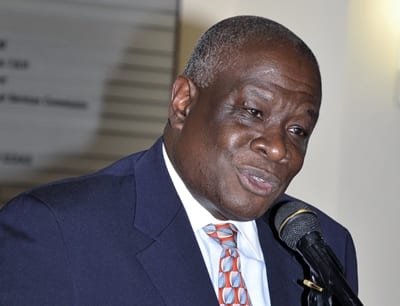
Chief Justice of Barbados, Sir Marston Gibson. (FP)
A change in the way victims of sexual assault are treated in Barbados and across the Caribbean is on the horizon.
Chief Justice Sir Marston Gibson underscored the need to establish clear guidelines for the prosecution of such matters, and for proper support mechanisms in place for virtual complainants in sexual assault cases beyond the trial.
He made these comments during the opening ceremony of a two-day consultation on sexual offence cases, hosted by the Judicial Reform and Institutional Strengthening (JURIST) Project at the Courtyard by Marriott, this morning.
Sir Marston explained that the prosecution of sexual offences in Barbados was “marred” by the length of time it took some matters to come to trial.
“What happens is that by the time we manage to get through the investigation, the jargon and the preliminary inquiry and get the matter to a trial judge, years have elapsed. So, a child who is abused at 13 finds themselves at 21 or 22 trying to remember what happened eight or nine years ago,” he pointed out.
However, the Chief Justice noted that under the JURIST Project, it was expected that new guidelines would be established for advancing the prosecution of these kinds of offences.
During his address, Sir Marston also spoke to the need to establish a support mechanism for virtual complainants, following the trial of sexual assault cases.
He explained that as it stands now, after a virtual complainant in a matter gives evidence “that was it”. But, he contended there was a need for a support mechanism to be in place to look after the welfare of the virtual complainant after the trial.
“That person still has to go back into society and to live, sometimes with the family; sometimes it may be someone from the village who was our neighbor,” he noted.
Sir Marston told the regional participants that this was necessary, as in some instances, attackers lived in close proximity to the complainants, and would be released back into the same neighbourhood.
The JURIST Project is funded by Canada, and Canadian High Commissioner, Marie Legault, said the guidelines developed through the consultation were part of a bigger envelope that was being executed by the Caribbean Court of Justice.
She explained that the JURIST Project was working with judiciary in the Caribbean to support respective efforts to improve court administration and strengthen the ability to resolve cases effectively and fairly.
“The aim of the project is to support the modernisation and strengthening of the court system’s processes and services, and to equip judicial officers and court staff with the skills and competencies necessary to deliver justice in a fair and good manner,” Ms. Legault said.
julia.rawlins-bentham@barbados.gov.bb
